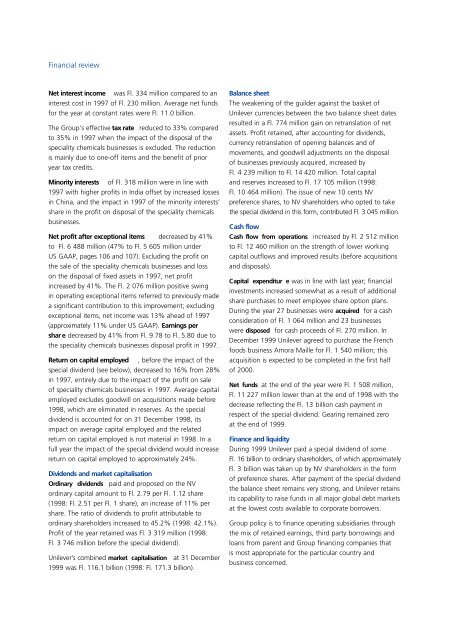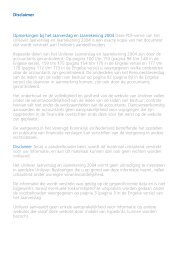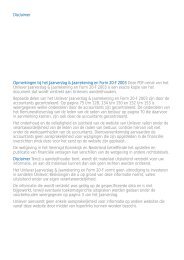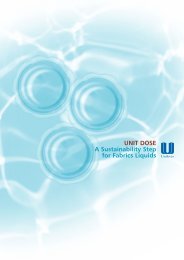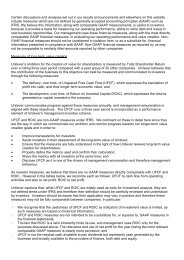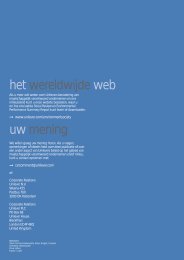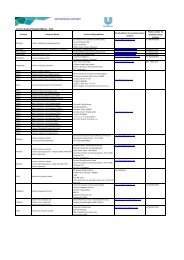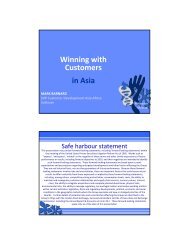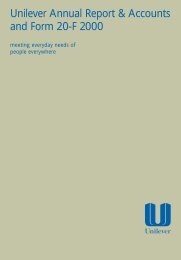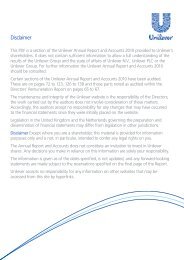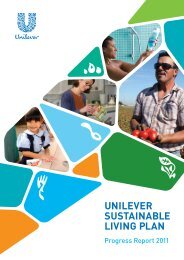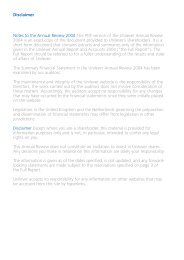Meeting everyday needs of people everywhere - Unilever
Meeting everyday needs of people everywhere - Unilever
Meeting everyday needs of people everywhere - Unilever
You also want an ePaper? Increase the reach of your titles
YUMPU automatically turns print PDFs into web optimized ePapers that Google loves.
Financial review<br />
Net interest income was Fl. 334 million compared to an<br />
interest cost in 1997 <strong>of</strong> Fl. 230 million. Average net funds<br />
for the year at constant rates were Fl. 11.0 billion.<br />
The Group’s effective tax rate reduced to 33% compared<br />
to 35% in 1997 when the impact <strong>of</strong> the disposal <strong>of</strong> the<br />
speciality chemicals businesses is excluded. The reduction<br />
is mainly due to one-<strong>of</strong>f items and the benefit <strong>of</strong> prior<br />
year tax credits.<br />
Minority interests <strong>of</strong> Fl. 318 million were in line with<br />
1997 with higher pr<strong>of</strong>its in India <strong>of</strong>fset by increased losses<br />
in China, and the impact in 1997 <strong>of</strong> the minority interests’<br />
share in the pr<strong>of</strong>it on disposal <strong>of</strong> the speciality chemicals<br />
businesses.<br />
Net pr<strong>of</strong>it after exceptional items decreased by 41%<br />
to Fl. 6 488 million (47% to Fl. 5 605 million under<br />
US GAAP, pages 106 and 107). Excluding the pr<strong>of</strong>it on<br />
the sale <strong>of</strong> the speciality chemicals businesses and loss<br />
on the disposal <strong>of</strong> fixed assets in 1997, net pr<strong>of</strong>it<br />
increased by 41%. The Fl. 2 076 million positive swing<br />
in operating exceptional items referred to previously made<br />
a significant contribution to this improvement; excluding<br />
exceptional items, net income was 13% ahead <strong>of</strong> 1997<br />
( a p p ro x i m a t e l y11% under US GAAP). Earnings per<br />
shar e decreased by 41% from Fl. 9.78 to Fl. 5.80 due to<br />
the speciality chemicals businesses disposal pr<strong>of</strong>it in 1997.<br />
Return on capital employed , before the impact <strong>of</strong> the<br />
special dividend (see below), decreased to 16% from 28%<br />
in 1997, entirely due to the impact <strong>of</strong> the pr<strong>of</strong>it on sale<br />
<strong>of</strong> speciality chemicals businesses in 1997. Average capital<br />
employed excludes goodwill on acquisitions made before<br />
1998, which are eliminated in reserves. As the special<br />
dividend is accounted for on 31 December 1998, its<br />
impact on average capital employed and the related<br />
return on capital employed is not material in 1998. In a<br />
full year the impact <strong>of</strong> the special dividend would increase<br />
return on capital employed to approximately 24%.<br />
Dividends and market capitalisation<br />
Ordinary dividends paid and proposed on the NV<br />
ordinary capital amount to Fl. 2.79 per Fl. 1.12 share<br />
(1998: Fl. 2.51 per Fl. 1 share), an increase <strong>of</strong> 11% per<br />
share. The ratio <strong>of</strong> dividends to pr<strong>of</strong>it attributable to<br />
ordinary shareholders increased to 45.2% (1998: 42.1%).<br />
Pr<strong>of</strong>it <strong>of</strong> the year retained was Fl. 3 319 million (1998:<br />
Fl. 3 746 million before the special dividend).<br />
U n i l e v e r ’s combined m a r k e t c a p i t a l i s a t i o n at 31 D e c e m b e r<br />
1999 was Fl. 116.1 billion (1998: Fl. 1 7 1 . 3 b i l l i o n ) .<br />
Balance sheet<br />
The weakening <strong>of</strong> the guilder against the basket <strong>of</strong><br />
<strong>Unilever</strong> currencies between the two balance sheet dates<br />
resulted in a Fl. 774 million gain on retranslation <strong>of</strong> net<br />
assets. Pr<strong>of</strong>it retained, after accounting for dividends,<br />
currency retranslation <strong>of</strong> opening balances and <strong>of</strong><br />
movements, and goodwill adjustments on the disposal<br />
<strong>of</strong> businesses previously acquired, increased by<br />
Fl. 4 239 million to Fl. 14 420 million. Total capital<br />
and reserves increased to Fl. 17 105 million (1998:<br />
Fl. 10 464 million). The issue <strong>of</strong> new 10 cents NV<br />
p re f e rence shares, to NV shareholders who opted to take<br />
the special dividend in this form, contributed Fl. 3 045 m i l l i o n .<br />
Cash flow<br />
Cash flow from operations increased by Fl. 2 512 million<br />
to Fl. 12 460 million on the strength <strong>of</strong> lower working<br />
capital outflows and improved results (before acquisitions<br />
and disposals).<br />
Capital expenditur e was in line with last year; financial<br />
investments increased somewhat as a result <strong>of</strong> additional<br />
share purchases to meet employee share option plans.<br />
During the year 27 businesses were acquired for a cash<br />
consideration <strong>of</strong> Fl. 1 064 million and 23 businesses<br />
were disposed for cash proceeds <strong>of</strong> Fl. 270 million. In<br />
December 1999 <strong>Unilever</strong> agreed to purchase the French<br />
foods business Amora Maille for Fl. 1 540 million; this<br />
acquisition is expected to be completed in the first half<br />
<strong>of</strong> 2000.<br />
Net funds at the end <strong>of</strong> the year were Fl. 1 508 million,<br />
Fl. 11 227 million lower than at the end <strong>of</strong> 1998 with the<br />
decrease reflecting the Fl. 13 billion cash payment in<br />
respect <strong>of</strong> the special dividend. Gearing remained zero<br />
at the end <strong>of</strong> 1999.<br />
Finance and liquidity<br />
During 1999 <strong>Unilever</strong> paid a special dividend <strong>of</strong> some<br />
F l . 1 6 billion to ordinary shareholders, <strong>of</strong> which appro x i m a t e l y<br />
Fl. 3 billion was taken up by NV shareholders in the form<br />
<strong>of</strong> pre f e rence shares. After payment <strong>of</strong> the special dividend<br />
the balance sheet remains very strong, and <strong>Unilever</strong> re t a i n s<br />
its capability to raise funds in all major global debt markets<br />
at the lowest costs available to corporate borro w e r s .<br />
Group policy is to finance operating subsidiaries through<br />
the mix <strong>of</strong> retained earnings, third party borrowings and<br />
loans from parent and Group financing companies that<br />
is most appropriate for the particular country and<br />
business concerned.


